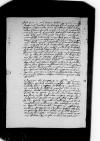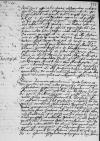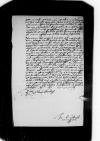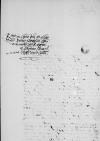Cum iam ⌊conventum⌋ prope absolutum esse existimo, remitto hunc paper damaged⌈[unc]unc paper damaged⌉ nuntium illustrissimi domini ⌊Ottonis Henrici comitis palatini Rheni⌋ cum litteris ad ⌊serenissimam maiestatem regiam⌋. Quem hucusque detinui, ne citius a ⌊maiestate regia⌋ expeditus, ⌊dominum paper damaged⌈[m]m paper damaged⌉ suum⌋ ad maiestatem regiam in ⌊conventum Petricoviensem⌋ adduxisset. Scripsit enim mihi ⌊dominus comes palatinus⌋ rogando, ut sibi significarem, quando ⌊conventus Regni⌋ celebrari deberet, ad quem vel fratrem suum ⌊Philippum⌋ missurus esset, vel ipsemet in persona venturus. Quantum hinc ⌊maiestas regia⌋ habuisset dispendii, praesertim cum constans debitum petitur, pro natura et conditione maiestatis regiae non latet me ad minus aliquot milibus ducatorum neutrum illorum a se absolvisset. Si in hoc egi contra ⌊maiestatis regiae⌋ voluntatem, non sum indignus venia. Nuntius tamen is, ut cum bonis et benignis litteris (quae aliqua ex parte diligentiam meam probent) a ⌊maiestate regia⌋ dimittatur, visum mihi est non inconsultum, multum siquidem ⌊princeps iste⌋ ⌊maiestati regiae⌋ se mihi affectum et addictum declaravit, cum nuper essem ⌊Ratisbonae⌋. Moram, quod nuntium tam diu apud me habuerim, cum ⌊domino Nibschicz⌋ excusavi, ad quem etiam erant litterae, quasi in illius et mea a curia absentia negotium nobis commissum non bene potuerit expediri. Debui aliquid ⌊domino comiti palatino⌋ rogatus, sed plus ⌊maiestati regiae⌋ etc.
Scripsi ⌊serenissimae maiestati regiae⌋, quibus mandatis contra Luteranismum et pro meo conservando officio egeam iussique illorum fieri exempla, quae his adiunxi. Ex his ea, quae peto, Dominatio Vestra Reverendissima intelliget. Quae concedi possunt, suscipio, quae non, ⌊maiestatis regiae⌋ arbitrio relinquo. Nisi ⌊maiestas regia⌋ sua me hic auctoritate fulciverit et in debita apud ⌊meos⌋ et ⌊vicinos⌋ me existimatione conservaverit, cum ea lues adeo mihi est proxima, actum erit.
 BNW, BOZ, 2053, TG 15, No. 1788, f. 170v Acti sunt a ⌊maiestate regia⌋ ⌊Gdani⌋ in exsilium mei consanguinei ⌊Iacobus⌋ ⌊et Adrianus Flint⌋, qui pro maiestate regia superioribus annis contra ⌊Moscovitas⌋ militaverant suis impensis, unde, ut non est incognitum Dominationi Vestrae Reverendissimae, quorundam ⌊Gdanensium⌋ contraxerant odium. ⌊Hi⌋ cum nunc malis abusibus, moribus et manifestae ⌊Luteranorum⌋ iniquitati, quae in ⌊Monte Regio⌋ impune regnat, infensi, redire in gremium ecclesiae, quod redeuntibus non clauditur, statuerint, neque etiam ab eo se longe declinasse asserant, utpote idiotae, qui magis militiae quam religioni fuerant addicti seque in fide maiorum et parentum suorum deinceps vivere et mori mihi promiserint, quod illos omnino facturos confido, sicut de his latius etiam ⌊maiestati regiae⌋ scripsi, Reverendissimam Dominationem Vestram ut dominum et patronum meum colendissimum maximopere rogo, dignetur ad maiestatem regiam intercedere, ut illos bonis suis ⌊Gdani⌋ restituat et liberam, quam prius ante exsilium habuerunt, ma<n>sionem concedat. Pro parvis delictis satis diu magnas dederunt poenas, cum pro magnis hi, qui superinscribed⌈quiqui superinscribed⌉ factionis huius fuerant duces et ⌊Gdani⌋ adhuc manent impune, nullas dederint.
BNW, BOZ, 2053, TG 15, No. 1788, f. 170v Acti sunt a ⌊maiestate regia⌋ ⌊Gdani⌋ in exsilium mei consanguinei ⌊Iacobus⌋ ⌊et Adrianus Flint⌋, qui pro maiestate regia superioribus annis contra ⌊Moscovitas⌋ militaverant suis impensis, unde, ut non est incognitum Dominationi Vestrae Reverendissimae, quorundam ⌊Gdanensium⌋ contraxerant odium. ⌊Hi⌋ cum nunc malis abusibus, moribus et manifestae ⌊Luteranorum⌋ iniquitati, quae in ⌊Monte Regio⌋ impune regnat, infensi, redire in gremium ecclesiae, quod redeuntibus non clauditur, statuerint, neque etiam ab eo se longe declinasse asserant, utpote idiotae, qui magis militiae quam religioni fuerant addicti seque in fide maiorum et parentum suorum deinceps vivere et mori mihi promiserint, quod illos omnino facturos confido, sicut de his latius etiam ⌊maiestati regiae⌋ scripsi, Reverendissimam Dominationem Vestram ut dominum et patronum meum colendissimum maximopere rogo, dignetur ad maiestatem regiam intercedere, ut illos bonis suis ⌊Gdani⌋ restituat et liberam, quam prius ante exsilium habuerunt, ma<n>sionem concedat. Pro parvis delictis satis diu magnas dederunt poenas, cum pro magnis hi, qui superinscribed⌈quiqui superinscribed⌉ factionis huius fuerant duces et ⌊Gdani⌋ adhuc manent impune, nullas dederint.
Superiori die ⌊⌋ Dominationi Vestrae Reverendissimae contra ⌊Hans Holsten⌋, quibus modis impostor ille ⌊viduae⌋ relictae olim ⌊Caspari Schilling⌋ imposuerit et mandato ⌊serenissimae maiestatis regiae⌋ ex cancellaria Dominationis Vestrae Reverendissimae dato written over um⌈umoo written over um⌉ adversatus sit et quod vidua haec litteras Dominationis Vestrae Reverendissimae, quas ad illam dare dignata fuit, mihi legendas miserit, ex quibus singularem gratiam et propensionem erga illam Dominationis Vestrae Reverendissimae liquido intellexi, unde tanto confidentius adhuc pro illa interce superinscribed⌈cece superinscribed⌉dere ad Dominationem Vestram Reverendissimam non vereor. Scripsit mihi afflicta haec ⌊vidua⌋, scripserunt et alii, quibus ⌊Holsten⌋ ille debet et plerique alii boni viri et quidam ⌊dominorum terrarum Prussiae⌋ non sine admiratione et animi dolore, quod nuper rediens ex ⌊Petricovia⌋  BNW, BOZ, 2053, TG 15, No. 1788, f. 171r Holsten ille a ⌊maiestate regia⌋ obtinuerit, quod illum regia maiestas in tutelam et clientelam suam paper damaged⌈[am]am paper damaged⌉ susceperit et ex omnium iurisdictione, cum ⌊civitatis paper damaged⌈[atis]atis paper damaged⌉ Gdanensis⌋, tum etiam ⌊terrarum Prussiae⌋, liberum fe paper damaged⌈[fe]fe paper damaged⌉cerit et quod neminem iudicem cognoscere debeat quam ipsam serenissimam maiestatem regiam et eiusdem commissarios et quod illi liberum sit quemcumque volet ex iure suo ad serenissimam maiestatem regiam protrahere, quemadmodum fecit huic afflictae viduae, cui ex mandato regio et decreto ⌊scabinorum Gdanensium⌋ tenetur facere rationem, qua posthabita, illam in ius ex iure suo civili ad maiestatem regiam vocavit. Quod insolens facinus apud nos nemo umquam audivit prius. Privilegia habemus, leges habemus, neque deest nobis processus iuris et nova eius ⌊serenissimae maiestatis regiae⌋ ordinatio. Illis tamen omnibus omissis et derogatis, ⌊homo iste⌋ ex ⌊Holsacia⌋ exoticus et qui malis artibus et imposturis crevit et vix umquam antea ⌊serenissimam maiestatem regiam⌋ vidit, de illaque nihil bene meritus, debet ista praeeminentia et praerogativa frui, quod ex omnium iurisdictione et ex iudiciis nostris omnibus per gratiam regiam, quam pessime meruit, exemptus sit et quod ille causam praebere dignus videatur, qua iura, privilegia et libertates nostrae infringi debeant. Qua re permotus, cum persuasum mihi habeam sine scientia vel saltem consensu Dominationis Vestrae Reverendissimae successisse istiusmodi insolitam ⌊homini⌋ impostori et quadruplatori concessam licentiam et quod prius Dominatio Vestra Reverendissima partes huius afflictae ⌊viduae⌋ iuste foverit, ⌊serenissimae maiestati regiae⌋ ex animo et pro debita fide mea, ut minimus consiliarius, scripsi, quo tales insolentias et novitates, quae ad novandas ms. novendas(!)
⌈novandasnovandas ms. novendas(!)
⌉ res se protendunt, fieri non permittat. Revera, mi Reverendissime et Colendissime Domine, nihil inde boni futurum esse potest, his praesertim periculosis temporibus, in quibus vulgus effrenes sumpsit animos. Et cum iam Dominatio Vestra Reverendissima
BNW, BOZ, 2053, TG 15, No. 1788, f. 171r Holsten ille a ⌊maiestate regia⌋ obtinuerit, quod illum regia maiestas in tutelam et clientelam suam paper damaged⌈[am]am paper damaged⌉ susceperit et ex omnium iurisdictione, cum ⌊civitatis paper damaged⌈[atis]atis paper damaged⌉ Gdanensis⌋, tum etiam ⌊terrarum Prussiae⌋, liberum fe paper damaged⌈[fe]fe paper damaged⌉cerit et quod neminem iudicem cognoscere debeat quam ipsam serenissimam maiestatem regiam et eiusdem commissarios et quod illi liberum sit quemcumque volet ex iure suo ad serenissimam maiestatem regiam protrahere, quemadmodum fecit huic afflictae viduae, cui ex mandato regio et decreto ⌊scabinorum Gdanensium⌋ tenetur facere rationem, qua posthabita, illam in ius ex iure suo civili ad maiestatem regiam vocavit. Quod insolens facinus apud nos nemo umquam audivit prius. Privilegia habemus, leges habemus, neque deest nobis processus iuris et nova eius ⌊serenissimae maiestatis regiae⌋ ordinatio. Illis tamen omnibus omissis et derogatis, ⌊homo iste⌋ ex ⌊Holsacia⌋ exoticus et qui malis artibus et imposturis crevit et vix umquam antea ⌊serenissimam maiestatem regiam⌋ vidit, de illaque nihil bene meritus, debet ista praeeminentia et praerogativa frui, quod ex omnium iurisdictione et ex iudiciis nostris omnibus per gratiam regiam, quam pessime meruit, exemptus sit et quod ille causam praebere dignus videatur, qua iura, privilegia et libertates nostrae infringi debeant. Qua re permotus, cum persuasum mihi habeam sine scientia vel saltem consensu Dominationis Vestrae Reverendissimae successisse istiusmodi insolitam ⌊homini⌋ impostori et quadruplatori concessam licentiam et quod prius Dominatio Vestra Reverendissima partes huius afflictae ⌊viduae⌋ iuste foverit, ⌊serenissimae maiestati regiae⌋ ex animo et pro debita fide mea, ut minimus consiliarius, scripsi, quo tales insolentias et novitates, quae ad novandas ms. novendas(!)
⌈novandasnovandas ms. novendas(!)
⌉ res se protendunt, fieri non permittat. Revera, mi Reverendissime et Colendissime Domine, nihil inde boni futurum esse potest, his praesertim periculosis temporibus, in quibus vulgus effrenes sumpsit animos. Et cum iam Dominatio Vestra Reverendissima  BNW, BOZ, 2053, TG 15, No. 1788, f. 171v pro aequitate causae huic afflictae ⌊viduae⌋ benigniter patrocinari dignata est, velit quaeso pergere et illam patrocinio suo apud ⌊serenissimam maiestatem regiam⌋ in hac tribulatione non destituere obtinereque pro illa mandatum regium, quo isti ⌊Holsten⌋ serio iubeatur et sub gravibus poenis cogatur decreto ⌊scabinorum⌋ satisfacere, hoc est rationem de perceptis reddere, quemadmodum in libro rationum habetur, cassando citationem inique et contra iura nostra factam contra ipsam viduam, quae ea in re omni gratitudine una mecum Dominationi Vestrae Reverendissimae respondebit.
BNW, BOZ, 2053, TG 15, No. 1788, f. 171v pro aequitate causae huic afflictae ⌊viduae⌋ benigniter patrocinari dignata est, velit quaeso pergere et illam patrocinio suo apud ⌊serenissimam maiestatem regiam⌋ in hac tribulatione non destituere obtinereque pro illa mandatum regium, quo isti ⌊Holsten⌋ serio iubeatur et sub gravibus poenis cogatur decreto ⌊scabinorum⌋ satisfacere, hoc est rationem de perceptis reddere, quemadmodum in libro rationum habetur, cassando citationem inique et contra iura nostra factam contra ipsam viduam, quae ea in re omni gratitudine una mecum Dominationi Vestrae Reverendissimae respondebit.
Quantum ⌊serenissimae maiestatis regiae⌋ litterae contra ⌊Alexandrum Sculteti⌋ canonicum Varmiensem profecerint, ex litterarum exemplo ⌊reverendissimi domini Varmiensis⌋ ad me Dominatio Vestra Reverendissima intelliget. In hoc tamen profuerunt, quod adhuc ab ⌊illo⌋ (quid moliatur nescio) non sentio me molestari. Velim etiam, pro gratia sua Dominatio Vestra Reverendissima me certiorem redderet, quid de coadiutoria ⌊serenissimae maiestati regiae⌋ a ⌊domino Varmiensi⌋ responsum. Ego non male spero, accepit me nuper ⌊dominatio eius reverendissima⌋ in filium spiritualem, iniciatura me pro 1533-03-23⌊Dominica Laetare1533-03-23⌋, 1533-03-25⌊Annuntiationis1533-03-25⌋ et 1533-03-30⌊Dominica Iudica1533-03-30⌋ sacris ordinibus, ut sim prius miles quam imperator, sacerdos priusquam episcopus, quem me adhuc ex impositione manuum Dominationis Vestrae Reverendissimae futurum, Deo bene favente, confido, etiamsi novo alieno aere me implicare debeam. Dominus providebit.
Habui, mi Reverendissime et Colendissime Domine, quamdiu afui, quendam Graudnicensem ⌊Lazarum⌋ praefectum in ⌊Goląbia⌋, qui et religione et rebus meis male est abusus, unde cum hoc in notitiam meam pervenisset, ne videretur id ipsum ex meo consensu fecisse, iussi illum officiali Radomiensi Dominationi Vestrae Reverendissimae deferri, a quo una cum testibus citatus, quid ad articulos propositos responderit et quid testes contra eum deposuerint, ex dictis testium liquet. Miserat mihi eas  BNW, BOZ, 2053, TG 15, No. 1788, f. 172r litteras dominus officialis, quas obsignatas ad Dominationem Vestram Reverendissimam scripserat et cum primo intuitu per imprudentiam ob titulum reverendissimi easdem aperuissem text damaged⌈[m]m text damaged⌉, ad Dominationem Vestram Reverendissimam spectare cognovi et postquam in eis processum contra ⌊Lazarum⌋ inesse vidissem, ad calcem usque perlegi, non ratus hanc au text damaged⌈[u]u text damaged⌉dentiam meam Dominationem Vestram Reverendissimam aegre laturam. Habetur ideo hic ⌊in castro meo⌋ idem ⌊Lazarus⌋ in carcere. Quicquid Dominatio Vestra Reverendissima de ⌊illo⌋ statuerit, aut si vult, quod rursus versus ⌊Radomiam⌋ remittatur, fiet, exspectoque ea de re Dominationis Vestrae Reverendissimae responsum, neque prius liberabitur, quam illud habeam. ⌊Homo⌋ perfidus et blasphemus in gloriosissimam ⌊Virginem⌋ et sanctos, praeterea seorsum in ⌊divam Agn<et>em⌋, cuius vitam ⌊sanctus Ambrosius⌋ non fuit dedignatus scribere, quam haereticus iste on the margin⌈haereticus istehaereticus iste on the margin⌉ lupam vocavit, ut hic per duos testes contra illum depositum est, non meretur impune dimitti. Quamcumque Dominatio Vestra Reverendissima de ⌊illo⌋ sententiam tulerit, habebit exsecutionem. De mala administratione et furto ⌊illius⌋ parum moveor, plus me religionis afficit iniuria etc.
BNW, BOZ, 2053, TG 15, No. 1788, f. 172r litteras dominus officialis, quas obsignatas ad Dominationem Vestram Reverendissimam scripserat et cum primo intuitu per imprudentiam ob titulum reverendissimi easdem aperuissem text damaged⌈[m]m text damaged⌉, ad Dominationem Vestram Reverendissimam spectare cognovi et postquam in eis processum contra ⌊Lazarum⌋ inesse vidissem, ad calcem usque perlegi, non ratus hanc au text damaged⌈[u]u text damaged⌉dentiam meam Dominationem Vestram Reverendissimam aegre laturam. Habetur ideo hic ⌊in castro meo⌋ idem ⌊Lazarus⌋ in carcere. Quicquid Dominatio Vestra Reverendissima de ⌊illo⌋ statuerit, aut si vult, quod rursus versus ⌊Radomiam⌋ remittatur, fiet, exspectoque ea de re Dominationis Vestrae Reverendissimae responsum, neque prius liberabitur, quam illud habeam. ⌊Homo⌋ perfidus et blasphemus in gloriosissimam ⌊Virginem⌋ et sanctos, praeterea seorsum in ⌊divam Agn<et>em⌋, cuius vitam ⌊sanctus Ambrosius⌋ non fuit dedignatus scribere, quam haereticus iste on the margin⌈haereticus istehaereticus iste on the margin⌉ lupam vocavit, ut hic per duos testes contra illum depositum est, non meretur impune dimitti. Quamcumque Dominatio Vestra Reverendissima de ⌊illo⌋ sententiam tulerit, habebit exsecutionem. De mala administratione et furto ⌊illius⌋ parum moveor, plus me religionis afficit iniuria etc.
Quae in ⌊Livonia⌋ aguntur, non puto latere Dominationem Vestram Reverendissimam et nisi adeo periculosis principiis obstabitur, experiemur, quem anguem in sinu fovemus et cum mihi de omnibus libere ad Dominationem Vestram Reverendissimam scribere liceat, non possum mihi temperare, quin animi mei superinscribed⌈meimei superinscribed⌉ sententiam declarem. Quod si ad eum modum sub praetextu religionis et ea episcopatuum ambitione ⌊marchiones Brandenburgenses⌋ ⌊Livoniam⌋ totam occupaverint, vix sinent ⌊Lithuaniam⌋ esse terminos suos. Habent ab alia parte ⌊regem Daniae Fredericum⌋, qui etiam se ius habere dicit in ⌊Livoniam⌋, praesertim in collatione episcopatuum, cum illo habetur pactum contra Livones episcopos, ut ⌊Vilhelmum⌋ omnibus modis intruderent et demum hoc, quod reliquum est, occuparent et Luteranismo omnia inficerent. Quid hinc futurum, facili coniectura Dominatio Vestra Reverendissima assequitur, praecipue si haec hominum  BNW, BOZ, 2053, TG 15, No. 1788, f. 172v praevaricatorum potentia et temeritas in dies sic fieret auctior, neque ⌊serenissima maiestas regia⌋ cum ⌊filio⌋, immo et ⌊Regnum⌋ quicquam inde boni sperare potest.
BNW, BOZ, 2053, TG 15, No. 1788, f. 172v praevaricatorum potentia et temeritas in dies sic fieret auctior, neque ⌊serenissima maiestas regia⌋ cum ⌊filio⌋, immo et ⌊Regnum⌋ quicquam inde boni sperare potest.
⌊Episcopus Osiliensis⌋ confirmatus a ⌊Sede Apostolica⌋ vivit et vivus ab ⌊eo⌋, qui non habet differentiam in cibis et ecclesiae nostrae eiusdemque caeremoniis etiam non clam adversatur, e sede deici debet? Scripsi quidem rogatus pro ⌊illo⌋, sed edoctus Osiliensem episcopum mortuum et ⌊istum⌋ canonice electum, in quo falsus sum plurimum. Qua de re Dominatio Vestra Reverendissima pro prudentia sua incomparabili dignetur ista apud se reputare et contra niti, quantum potest, ne ecclesiae nostrae episcopi ab hominibus malis spiritibus exagitatis detrudantur. Colligitur a ⌊vicinis meis⌋ equitatus et peditatus contra ⌊Livones⌋, qui recognoscunt ⌊imperium⌋ et procul dubio clamabunt et suppetias ab imperio postulabunt. Et cum prius bannum sit prae foribus, verendum est maxime ista de causa, quod status et ordines imperii citius quam prius et bannum in exsecutionem ponent et fortassis gentes mittent fieretque sic
cf. Vulg. Mt 27.64 ⌊novissimus error peior prioricf. Vulg. Mt 27.64 ⌋. Haec profecto nullo affectu aut animi passione, sed pro superinscribed⌈propro superinscribed⌉ fide mea et iudicio, qualecumque hoc in me est, confidenter Dominationi Vestrae Reverendissimae scribo, quae peto in bonam partem neque aliorsum atque ego sentio, suscipi.
⌊Oppidum Graudnicense⌋, cuius ⌊plebanus⌋ ad desperatum illum Pomezaniensem, ducta suae farinae coniuge, secessit, totum est Luteranismo infectum et hoc, ut ferunt, culpa capitanei ⌊Ioannis Sokolowski⌋, qui etiam, sicut quidam asserunt, ea lue laboravit vel laborat. Ecclesia et schola ⌊ibidem⌋, quae mihi puero prima fuit, et domus parochialis vasta et ruinis obnoxia, cuperem igitur in debitum ordinem restituere omnia et rursus pro ista Quadragesima parochum illic statuere, quod sine permissione ⌊serenissimae maiestatis regiae⌋ non licet, quae ius habet praesentandi. Quod mihi pro hac vice dumtaxat  BNW, BOZ, 2053, TG 15, No. 1788, f. 173r peto concedi, quemadmodum et alia mandata, quorum his adiunxi exempla, salvo iure etc. Quae si sic obtinuero, spero non paucas oves errantes in caulas me reducturum. Ad quod si Dominatio Vestra Reverendissima adminiculum suum mihi praestiterit, in primis de Deo Omnipotente et eius ⌊Sancta Ecclesia⌋ bene merebitur et me in officii mei debito reddet stabiliorem.
BNW, BOZ, 2053, TG 15, No. 1788, f. 173r peto concedi, quemadmodum et alia mandata, quorum his adiunxi exempla, salvo iure etc. Quae si sic obtinuero, spero non paucas oves errantes in caulas me reducturum. Ad quod si Dominatio Vestra Reverendissima adminiculum suum mihi praestiterit, in primis de Deo Omnipotente et eius ⌊Sancta Ecclesia⌋ bene merebitur et me in officii mei debito reddet stabiliorem.
Nova in hoc angulo pauca ad me perferun text damaged⌈[n]n text damaged⌉tur. Accepi tamen paulo ante ex ⌊Brabantia⌋ litteras. Oratores ⌊regis Daniae Frederici⌋ fuisse apud serenissimam ⌊reginam Ungariae Mariam⌋, illarum terrarum gubernatricem, quos grate fertur suscepisse et cum illis de libera utrimque navigatione transegisse, ⌊Lubecenses⌋ vero durius a se dimisisse, qui minabantur non permissuros navigare ⌊Hollandos⌋. Conclusum etiam matrimonium inter ⌊filiam⌋ maiorem natu ⌊regis Christierni Daniae captivi⌋, neptem ⌊caesaris⌋ et principem ⌊Orangiae⌋, ⌊filium⌋ illustrissimi ⌊domini comitis de Nassau⌋. Si quid vicissim novi Dominatio Vestra Reverendissima ex curia ⌊caesaris⌋ et quid de ⌊Hungaris⌋ habuerit, ad me cum hoc meo nuntio et de aliis rebus, in quibus responsum Dominationis Vestrae Reverendissimae exspecto, perscribi iubeat. Dominationi Vestrae Reverendissimae, ut domino et patrono meo colendissimo, me totum commendo ac dedo Deumque oro, ut illam mihi quam diutissime in prospera valetudine omnisque felicitatis accessu conservet.
 BNW, BOZ, 2053, TG 15, No. 1788, f. 173v
BNW, BOZ, 2053, TG 15, No. 1788, f. 173v  BNW, BOZ, 2053, TG 15, No. 1788, f. 170r
BNW, BOZ, 2053, TG 15, No. 1788, f. 170r
 BNW, BOZ, 2053, TG 15, No. 1788, f. 170v Acti sunt a
BNW, BOZ, 2053, TG 15, No. 1788, f. 170v Acti sunt a  BNW, BOZ, 2053, TG 15, No. 1788, f. 171r Holsten ille a
BNW, BOZ, 2053, TG 15, No. 1788, f. 171r Holsten ille a  BNW, BOZ, 2053, TG 15, No. 1788, f. 171v pro aequitate causae huic afflictae
BNW, BOZ, 2053, TG 15, No. 1788, f. 171v pro aequitate causae huic afflictae  BNW, BOZ, 2053, TG 15, No. 1788, f. 172r litteras dominus officialis, quas obsignatas ad Dominationem Vestram Reverendissimam scripserat et cum primo intuitu per imprudentiam ob titulum reverendissimi easdem aperuissem text damaged⌈[m]m text damaged⌉, ad Dominationem Vestram Reverendissimam spectare cognovi et postquam in eis processum contra
BNW, BOZ, 2053, TG 15, No. 1788, f. 172r litteras dominus officialis, quas obsignatas ad Dominationem Vestram Reverendissimam scripserat et cum primo intuitu per imprudentiam ob titulum reverendissimi easdem aperuissem text damaged⌈[m]m text damaged⌉, ad Dominationem Vestram Reverendissimam spectare cognovi et postquam in eis processum contra  BNW, BOZ, 2053, TG 15, No. 1788, f. 172v praevaricatorum potentia et temeritas in dies sic fieret auctior, neque
BNW, BOZ, 2053, TG 15, No. 1788, f. 172v praevaricatorum potentia et temeritas in dies sic fieret auctior, neque  BNW, BOZ, 2053, TG 15, No. 1788, f. 173r peto concedi, quemadmodum et alia mandata, quorum his adiunxi exempla, salvo iure etc. Quae si sic obtinuero, spero non paucas oves errantes in caulas me reducturum. Ad quod si Dominatio Vestra Reverendissima adminiculum suum mihi praestiterit, in primis de Deo Omnipotente et eius
BNW, BOZ, 2053, TG 15, No. 1788, f. 173r peto concedi, quemadmodum et alia mandata, quorum his adiunxi exempla, salvo iure etc. Quae si sic obtinuero, spero non paucas oves errantes in caulas me reducturum. Ad quod si Dominatio Vestra Reverendissima adminiculum suum mihi praestiterit, in primis de Deo Omnipotente et eius 






